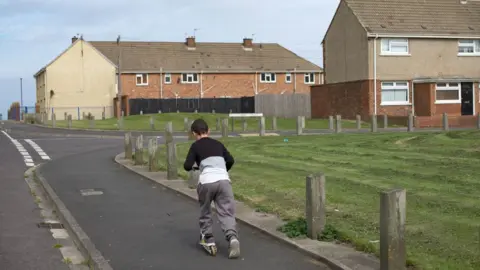Covid: People in 'left behind' communities more likely to die
 Getty Images
Getty ImagesPeople in England's "left behind" communities were 46% more likely to die from Covid-19 than those living in the rest of the country, a study has found.
The report concluded people in these areas worked longer hours and lived shorter lives, with more ill health.
"Left behind" neighbourhoods (LBNs) differ from regular deprived areas by having fewer social and cultural assets, on top of economic problems.
County Durham had by far the highest number of LBNs of any local authority.
As of April 2021, there were 16 LBNs in County Durham. The next highest was Birmingham with nine.
The LBNs are mainly found in the North and Midlands in de-industrialised areas - as well as coastal areas in the South.
Halton in Cheshire, Sunderland, Kingston upon Hull and Tendring in Essex were all found to have eight, with Knowsley, Northumberland, Stockton-on-Tees and Stoke-on-Trent also in the top 10 of local authority areas with LBNs.
A joint report by the All-Parliamentary Party Group (APPG) for LBNs and the Northern Health Science Alliance has called for measures to reduce health inequalities.
Paul Howell, Conservative MP for Sedgefield and co-chair of the APPG, said: "The findings from this report are clear; people living in 'left behind' neighbourhoods are overall worse off when it comes to health and something needs to change."
Co-chair Dame Diana Johnson, Labour MP for Kingston-upon-Hull North, added: "Whilst sustained investment in our health system is needed to make this possible, support and funding at a local level is also needed to ensure people and the communities in which they live in are happy, healthy and thriving, rather than continuing to be left behind."
'A long shadow'
The study found:
- People living in LBNs were 46% more likely to die from Covid-19 than those in the rest of England and 7% more likely to have died of the virus than those living in regular deprived areas.
- Life expectancy for men was 3.7 years fewer than average and three years fewer for women.
- People in these neighbourhoods can expect to live 7.5 fewer years in good health than their counterparts in the rest of England.
LBNs lack places to meet, connectivity, good transport links and an active and engaged community.
Professor Clare Bambra, a public health expert at Newcastle University who co-authored the report, said a lack of investment in key services has meant more deprived neighbourhoods - particularly in the north - have suffered disproportionately for too long.
She said: "The Covid-19 pandemic has worsened these inequalities and it will cast a long shadow across our future heath and economic prosperity as a country unless we act now.
"That's why levelling up health needs to be central to the Government's overall approach to levelling up the country."

Follow BBC North East & Cumbria on Twitter, Facebook and Instagram. Send your story ideas to [email protected].
